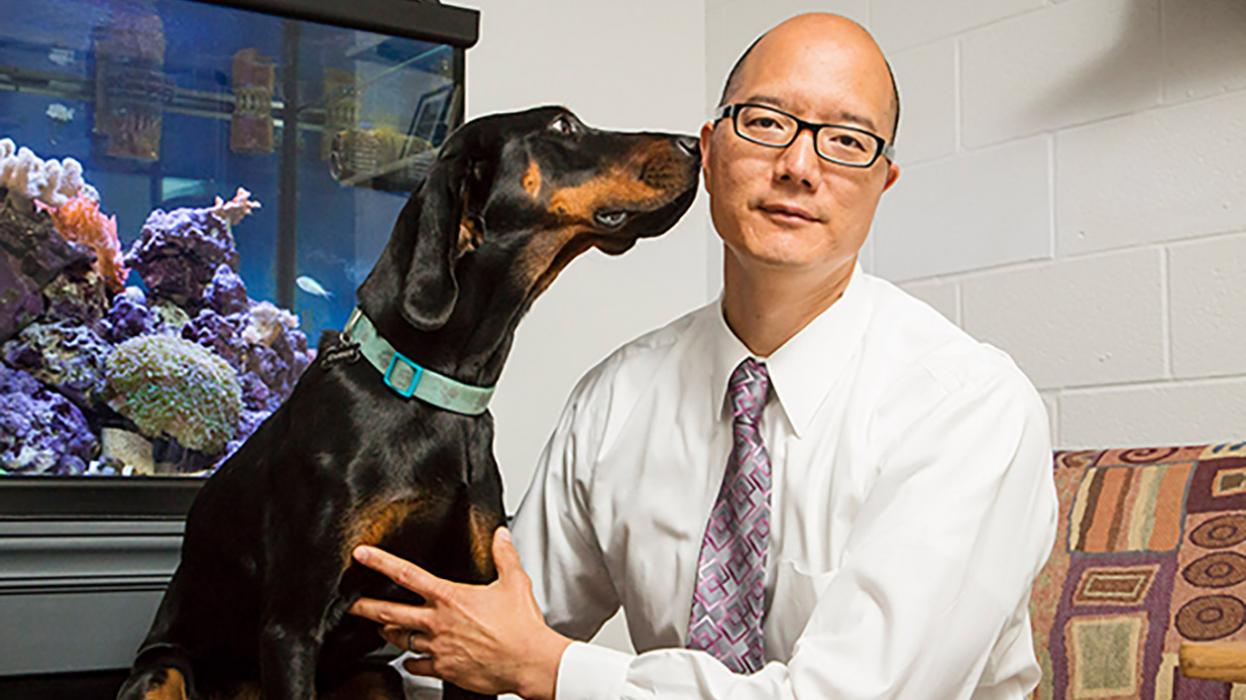Research collaboration turns up the heat in cancer immunotherapy

Tim Fan, a professor of veterinary medical science, is collaborating with former Illinois faculty member Dane Wittrup on an innovative cancer immunotherapy research project with client-owned pet dogs that have soft-tissue sarcoma. / L. Brian Stauffer
The results of a recent canine cancer study by Tim Fan (ACPP/CGD), a professor of veterinary clinical medicine, and former Illinois faculty member Dane Wittrup may have positive implications for future approaches to cancer immunotherapy. The team designed and tested an innovative cytokine-injection strategy that successfully upregulated an intense inflammatory response of the canine immune system to fight cancer.
“This is a perfect example of an organic, grassroots collaboration that developed over the years and is now bearing fruit in the lab,” said Fan, who traces his collaboration with Wittrup back to a dinner in 2019 initiated by Professor Emeritus David Kranz (ACPP). Wittrup, whose MIT lab is renowned for its work in protein engineering, was a professor of chemical engineering at Illinois from 1989 to 1999. When Fan met Wittrup, he was designing new ways to retain inflammatory proteins in the local tumor microenvironment (TME). At the same time, Fan was investigating novel immunostimulatory approaches in pet dogs and cats. “Despite the challenges of the COVID pandemic, we maintained a collaborative relationship, spanning the distance from MIT to Illinois. Eventually, we started testing some of Dane’s engineered proteins in healthy research dogs to define their safety, then moved to treating pet dogs with naturally occurring cancers to demonstrate the real-world promise of the technology,” said Fan. “This pilot project led to a successful submission of RO1 funding, and we are now in our second year of discovery efforts.”
For this project, Fan and Wittrup tackled the problems associated with “cold” tumors – cancerous cells that do not solicit the immune system’s attention. The immune system can perform brilliantly when all signals and mechanisms function properly. Still, tumors can be a trojan horse that slips past the body’s defenses, circumventing the immune system’s attention. Fan and Wittrup wanted to awaken and motivate the immune system by “turning up the heat,” inciting the inflammatory signals in the TME.
How did they do this? Thanks to a family of proteins called cytokines that are critical for regulating the activity and growth of immune system cells. When they do their job, they announce to the immune system, “We’ve got a problem here. Get to work.” Ordinarily, inflammatory cytokines cannot be administered systematically to a human or a dog because the immune response is amplified too drastically, resulting in runaway inflammatory disorders or even death. Fan and Wittrup remedied this problem by designing canine-specific cytokines engineered in Wittrup’s lab – interleukin 2 and interleukin 12, to remain localized in the TME following intratumoral injections.
It was no small feat of innovation to create caninized cytokines. Dane’s group designed these instrumental proteins by taking a linker protein – canine albumin – and adding it to another peptide sequence called LAIR1 that binds to common proteins – collagen type 1 and collage type 4 – within the TME. The albumin’s job is to constrain the canine cytokines, keeping them appropriately sized for optimal diffusion within the TME. Finally, another peptide sequence – canine LAIR1 – binds to the collagen, keeping the cytokine protein within the TME.
They hypothesized that the cytokine injection would ignite an intense and localized inflammatory response, sufficient to activate the immune system without harmful leakage into the bloodstream. While they acknowledge the value of mouse models in cancer research, there are limitations to interpretations of how the strategies will translate to humans. The team believed they could gather more reliable results for possible translational cancer therapeutics with pet dogs that develop cancer naturally, similar to people. Fan recruited ten client-owned canine patients, injected Wittrup’s cytokines into external soft-tissue sarcoma sites, and then analyzed the results.
What happened? As reported in their paper “Collagen-Anchored Interleukin-2 and Interleukin-12 Safely Reprogram the Tumor Microenvironment in Canine Soft-Tissue Sarcomas” in Clinical Cancer Research, they discovered exciting evidence that the timing of the cytokine dose was crucial. “There were two big takeaways from this experiment, “said Fan. “First, intratumoral anchoring – deposition of cytokines – is safe and effective in eliciting a robust immune response. Secondly, even though we induced an inflammatory signal, counter-regulatory mechanisms quickly extinguished it. This study demonstrates that single-agent immunotherapies, while potent in exerting activity, will likely be more effective when used in combination with other therapies that mitigate compensatory measures initiated by the immune system to control inflammation.”
What’s next for the research team? Fan and Wittrup learned that timing is critical for the efficacy of this strategy, and they recognize the need for a lucid understanding of the counter-regulatory mechanisms that extinguish the inflammation. In response, they are designing future studies to understand better these variables and how to use other adjuvant therapies to mitigate the rapid extinguishing of the inflammation at the tumor site. The team will pursue additional funding that involves new investigators who can bring imaging expertise to the team for noninvasive tumor analysis.
The team is optimistic about the results of this study and the implications for future cancer therapeutics. “Ideally, we will further advance the novelty, activity, and reproducible benefit of this cytokine strategy for cancer immunotherapy,” said Fan.
Tim Fan is a Cancer Center at Illinois (CCIL) program leader, a professor of veterinary clinical medicine at the College of Veterinary Medicine, and is affiliated with the Carle Illinois College of Medicine. This research was supported by the National Institutes of Health.
